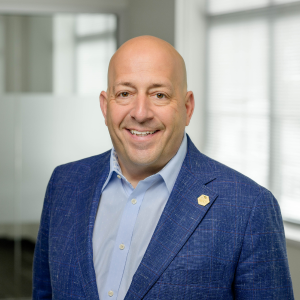More Than Weight Loss: A Steady Diet of Support and Achievement
| BY MICHAEL PELTIER, ASSISTANT EDITOR |
| More than weight loss: A steady diet of support and achievement A skilled nursing facility treats bariatric residents with individualized therapy-and the reinforcement of a group |
| “It’s not an individual who has a weight issue,” says Karyn French, director of social services at Andover Village Retirement Community in Andover, Ohio, “because everybody is here pulling for each other. There’s a very good support system among the residents.” To bariatric and other residents, Andover Village offers physical, occupational, and speech therapy; dietary education; psychological and group support services; preop and postop care; and discharge planning. The facility also offers dialysis and respiratory services, and is adjacent to an emergency center. It does not offer, though, bariatric surgery; instead treatment focuses on major lifestyle changes. Residents have come from across the country-and Puerto Rico-to get help. The distance adds to the difficulty of treatment. “The hardest thing about being here is being away from family and friends,” says one resident from Louisiana. The organization has been treating bariatric residents for more than 10 years. It began with just one bariatric resident and has snowballed from there. Roughly one-third of Andover Village’s approximately 180 residents are bariatric-weighing as much as 1,000 pounds. “We’ve got some people who haven’t been mobile for years, who haven’t been out of a single room in their house,” French notes. |
| Individualized Treatment “The biggest challenge for our residents: motivation,” French says. “Sometimes the scale is an enemy. When you get on that scale, if it’s not reflecting what you want it to reflect, there are tears, there is anger, there is frustration, there is wanting to give up.” Andover Village’s physicians request that residents stay a minimum of 90 days. “To come in and think you’re going to get it all down pat in two to four weeks-that’s not a realistic expectation,” French explains. Comorbidities residents may have, including diabetes, cellulitis, lymphadema, and kidney disease, complicate treatment. And residents’ health problems aren’t all physical. French says the staff deal with “a lot of mental health issues.” She adds, “Depression is probably number one. There are some compulsion disorders. Self-esteem is usually in the pits.” Staff also deal with family issues such as ensuring that family members are not trying to bring junk food to the residents. But family members can bring a crucial element to residents: support. Even loved ones from across the country visit residents, and some residents talk on the phone with family and friends every night. Andover Village stresses interaction between residents and a strong support system. “People who may have been in their homes for three or four years haven’t had any social contacts or have been demoralized by family or medical practitioners,” French says. Residents might have been mistreated or abused by family members because of their weight. “They get here and say, ‘Oh, this is pretty good,‘” she notes (although, she adds, that can create problems later on if residents make improvements but lack the motivation to leave the facility). The bariatric residents form friendships that last past their stays at the facility, and they also develop friendships with the older residents in the facility, including those with dementia. Former residents have stopped by to see old friends and show staff their continued results. “If they’re close enough, they’ll stop by and visit every once in a while,” French says, “which is a really good thing, too, because they’re able to say, ‘Look how much more I’ve lost,’ or ‘Look how my mobility is continuing to improve.'” She stresses that former residents must continue with treatments that have led to success-including those that address mental health. “When people leave, they need to continue that kind of counseling relationship or some kind of outside service,” she explains. Unfortunately, some bariatric residents return to Andover Village because they haven’t achieved their goals. And some residents, for financial or other reasons, must leave before reaching their ambitions. |
| Education and Diet “We set goals for people,” French says. “What do you want to achieve?” Andover Village offers a basic, balanced diet that follows the food pyramid and good eating habits. “And that’s where a lot of our education component comes in, because folks don’t know or have forgotten what good eating habits are.” The education component goes hand-in-hand with diet in support groups offered five days a week before lunch and dinner. Educational resources are found in the facility’s HIP (Health Is Priceless) Tips newsletter. The HIP program, which began in 2003, includes a newsletter with a schedule, a menu, and information. Residents also receive a notebook with reference information they compile and a journal to record eating habits, measurements, and feelings. Another part of HIP is the “Weight to Go” Group Melt-Down, which began tallying the number of pounds residents have lost with a giant thermometer that hangs on the Andover Village’s wall-the facility is now on its fourth thermometer. “We have counted our pounds down, and we have reached 7,747 pounds,” French boasts. “We started in April 2003 and by the first December we reached a thousand pounds-we were just blown away. We thought that was a spectacular accomplishment. We had so much fun celebrating that.” The organization holds an awards ceremony every month to recognize residents’ success and keep them motivated. “We tie in a theme every time we celebrate; for example, we have a car show in the summertime, but the first year we celebrated, we rolled in 42 tires we borrowed from a local tire shop-that was equivalent to what we lost that year in pounds,” French explains. The next year, Andover Village brought in an Oldsmobile Alero to represent the number of pounds lost, and this past year a Buick Rainier symbolized lost weight. “Next year, I’m going for the dualie pickup truck!” French says, laughing. |
| Equipment and Design When Andover Village began accepting bariatric residents, finding adequate equipment for their treatment and transfer was not easy. “When we started, there was nothing. Absolutely nothing out there,” French says. “We adapted beds here. Our maintenance crew would build them so that we could put two bedframes together and get a full-size mattress to be able to accommodate the width of beds, because you couldn’t find big beds.” While bed size was a problem, room size and setup were not; the facility has never had to adjust either as its bariatric program has grown. Furniture and devices such as living room chairs, scales, wheelchairs, lifts, and gurneys have evolved to accommodate bariatric residents. Now that this equipment is easier to find, Andover Village has purchased all the amenities. “Would you want to live without taking a shower ever?” French asks. “No. We’ve got a shower gurney that holds 1,000 pounds,” she says. “If they can’t stand up and go to the shower or sit in a shower chair, we get them on a gurney and they go to the shower.” |
| At conventions and conferences French and other staff members have attended, they have seen more companies developing products for the bariatric population. Unfortunately, these products can be quite expensive. “If you’ve only got three or four people in your facility who are in need,” French notes, “it’s hard to justify spending $10,000 on a piece of equipment.” This is not a problem at Andover Village, though, where 60-some bariatric residents provide a cost-effective market for a piece of equipment. “Chances are we’re going to use it continuously for our larger population of bariatric folks,” she adds. A facility needs to evaluate each piece of equipment’s possible value on an individual basis, she says. Other facilities have asked French and Andover Village for advice regarding long-term care for bariatric residents. French points out obvious things like doorways and larger wheelchairs, and more complex problems such as transporting bariatric residents inside and outside the facility and getting residents to procedures such as an x-ray or an MRI. Residents also face clinical complexities with these procedures, including positioning and comfort issues. Andover Village has never had to retrofit its facility to accommodate the increase in its bariatric population, but it has had to update its electrical systems to handle the influx of technology available to today’s residents. “They are wired-they’ve got the Internet, DVD players, TVs, stereos,” French says. “When nursing homes were designed, they weren’t designed to have your home theater system in your room!” |
And speaking of TV, the organization’s bariatric program has received its share of national attention-the facility was the topic of two hourlong reality TV shows: The 750 Pound Man, which aired on TLC, and Super Obese on the Discovery Health Channel. Super Obese featured a visit by famed fitness fanatic-and formerly overweight-Richard Simmons. The national exposure has led to more inquiries from around the country from both potential residents and other healthcare facilities seeking help. French offers a suggestion for facilities looking to increase their census: “Bariatrics. There’s a big need. But the facilities need to be geared up to meet those needs, instead of just taking somebody to fill the bed and leave them in the bed.” For French, the program is rewarding for both residents and staff. Residents are able to make lifestyle changes for better health, and staff can see tangible improvements in them. “Just knowing that you can have that kind of impact-and if its just one person that can make that kind of improvement, it’s worth it,” she says. “But we see it over and over again.” |
| For more information on Andover Village Retirement Community, phone (440) 293-5416 or visit www.andoverretirement.com. To send your comments to the author and editors, please e-mail peltier0606@nursinghomesmagazine.com |
I Advance Senior Care is the industry-leading source for practical, in-depth, business-building, and resident care information for owners, executives, administrators, and directors of nursing at assisted living communities, skilled nursing facilities, post-acute facilities, and continuing care retirement communities. The I Advance Senior Care editorial team and industry experts provide market analysis, strategic direction, policy commentary, clinical best-practices, business management, and technology breakthroughs.
I Advance Senior Care is part of the Institute for the Advancement of Senior Care and published by Plain-English Health Care.
Related Articles
Topics: Articles , Nutrition , Rehabilitation











